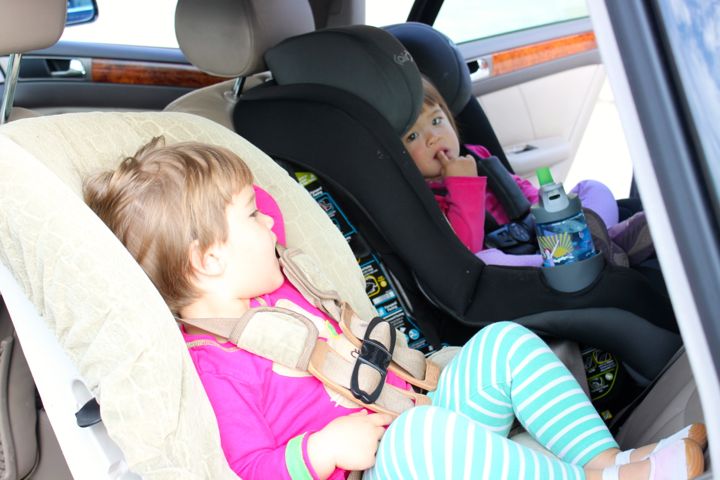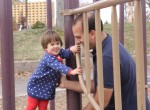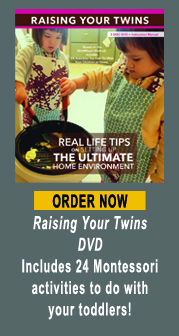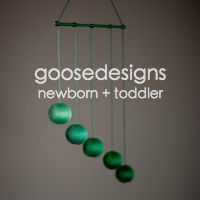How to Avoid the Terrible Twos
“She always trying to get her way. She’s just spoiled,” I hear so many parents say about their toddlers. Even my husband said it this morning about Brooke.
We’re parked (illegally) on the side of the road because Mark forgot to buckle in Brooke. I’m kneeling on the front seat reaching back to buckle her in as quickly as I can. She starts whining, “Daddy.” She wants Mark to do it because he usually does. I say, “No, Mama is gonna do it.” She stops whining for a while. I buckle the bottom left buckle, she cries, “No, No!” I do it anyway because we need to get moving fast. She starts crying and struggling in her seat, trying to unbuckle the buckle. At the same time, I can see she’s trying to get her other arm under the right strap. With all that struggling and crying, Mark says impatiently, “She’s always trying to get her way.”
I know that isn’t why she’s crying. It was obvious that I wasn’t doing things in the order that she’s used to. First of all, Mark usually buckles her in and he buckles her in a certain way. I’m clearly not doing it that way. Order is critical to the young child, including the order in which you do something as well as the order of things within the environment. If the order is off or it isn’t what she’s used to, you can expect a tantrum. She’s not trying to annoy you, there simply is a need of hers that isn’t met.
Just to give you an idea of what I mean. Every morning, I need to do these things to wake up: brush my teeth, wash my face, drink a cup of water, followed by a cup of light, sweet coffee. If I miss any of those things in that order, something feels wrong. And then my day is just a little bit off. Unless I’ve run out of sugar, half-and-half or coffee altogether. Then don’t even try to talk to me. Now, imagine you and I lived together, even if you don’t have those same needs, you’d most likely respect mine, right? To avoid my morning rage, you might even put my coffee on for me and gently coax me to drink it as quickly as possible! What about your toddler? They have an intense need for order, which you may or may not need. What do you do when they express their anger, frustration and disappointment because their need for order isn’t met?
I decided to let Brooke show me what she needed. First, I unbuckled the bottom left buckle that I had forced on her. And then I waited to see what she would do. She slipped her right arm under the strap and buckled the cross buckle. Now that both arms are under the strap and the cross buckle done, she waited for me to buckle the bottom buckles, which I did. I got it right this time. She sat back, looked out the window and started singing ‘Itsy-Bitsy Spider.’ We drove off and heard nothing but singing from her the rest of the ride. She knew exactly what she wanted. If I hadn’t fulfilled that need, we would’ve heard crying the whole way home. Instead we had peace and quiet.
A toddler needs order around her because she’s learning how the world works. Once she becomes a six-year old and internalized that order, she doesn’t need external order as much anymore. That’s why elementary school kids can be complete slobs and still be happy. People call the toddler years The Terrible Twos and Threes. That’s because toddlers are misunderstood. They have a need that you and I as adults no longer need and we can’t understand what’s the big deal. Well, it is for them. And if you’re looking to coexist peacefully with your little one, start watching carefully. Next time your toddler suddenly starts screaming, figure out what’s different from the way she’s used to. Is something not on the same shelf she’s used to? Is something not done is the sequence she’s used to? Is the day’s routine different than usual? If you can figure out the clue to this puzzle, your toddler – and you – will be much happier. And then you’ll see, the terrible twos doesn’t have to be so terrible.











Excellent article. I just shared this article with parents
on my Facebook Group MaMa & BeBe as well. 😉
Indeed toddlers have a need for order and sameness as what Dr Maria Montessori says, “In the first two years of life, children are in a sensitive period for order and are especially attentive to things being put in their proper places and done in proper ways. During this period, children get upset if someone who usually wears a hat is not wearing one, or if a chair that is always in one place gets moved to a different place. The temper of the 2-year-old are often due to adults being insensitive to the child’s particularly strong need for order and sameness. For the tiny child, order is like the plane on which terrestrial beings must rest if they are to go forward.”
My son is 2 ans very spirited, full of will and determination. He is also very provocative and always tries to do things that are forbidden, he does not listen ‘no’ or other variants and is often touching, throwing, making fall objects in the House or outside. I try not to forbid or impose when not necessery, try to explain, but the tantrums are always there. I can see why your daughter reacted the way she did, but what if it was about something with no ‘good’ reason? Like screaming for something she can t hâve or do because it s just too dangerous or plain impossible? What if it happened 20 times a day?
I m so tired of power struggles. And i think that some kids are just more impulsive and spirited than others. But All i see on montessori blogs are children who are pretty calm and have a great sense of order. What about the child who acts like a tornado and destroy his and your things? What about the kid who is always testing the limits, hits and have fists?
I try my best to do montessori because, in many ways, it s what i think is best for me And my kid. But i often feel either incompetent or lonely regarding what i read and see on blogs. Do you know any Resources for différent kind of children? Maybe adhd related?
Thank you for your blog, i love thé videos!
Dear Anais,
I’m so glad you wrote to ask these questions. I watned to emphasize in my article that often when it seems like children are just screaming for no good reason, it’s actually because some need of the child is not getting addressed. It may look like to you that he is being provocative and doing dangerous things on purpose but perhaps you have overlooked a need of his. I don’t know what you son’s needs are without seeing him and talking to you further, but that’s when the detective work comes in.
The children you see on Montessori blogs and classrooms are not calm because they are born that way. It is all in the environment. How to set up that environment, both physical and emotional, is a big area of study that us Montessorians spend years of our lives testing and improving. The environments has been tested over and over all around the world for 100 years now, since Dr. Montessori created her first classroom. And each of us who work in our own Montessori environments are still improving upon it for the specific children in our classrooms and homes. Our job is to figure out how to make it perfect for all the various personalities and temperaments of the children we have. And I challenge you to consider that is your job as well. How to make that home environment perfect for your child’s temperament and personality. Please contact me individually and we can chat on the phone to see if there is something you can try differently.
Thank you so much for creating this blog. It has really given me a better understanding of what Montessori is, and should be, all about.
This is a little premature, I suppose, but I’m just wondering what plans you have for B and M as they get older. Will they be going to a Montessori elementary school or some other kind of school with a philosophy that you are comfortable with? And how do you plan on transitioning the girls into this new environment?
Also, for much much much future planning, have you heard of Sudbury Valley Schools? What do you think about their school philosophy?
HI Anais,
I hear your frustrations as a parent! Why the heck is your child a tornado and these freaking Montessorians preaching perfectly calm and orderly children. I hear how it can create doubt in your parenting abilities especially when you resonate with the Montessori approach.
It can be really tricky to figure out why your child is acting, reacting, or responding. Some times it can feel from the adult/parent perspective that there is nothing to be upset about. Unfortunately children do not have the communication skills where they can clearly say why they are in uproar. Fortunately for us as adults we can try our best to guess what it is that is causing the upset.
One thing I do as a fun game for myself is to practice my observation skills of the children (and myself). I will quietly watch and listen to what s/he is doing as an individual and as a group. Then I will try to guess what s/he and/or the group will do next. For example a child is dribbling with a basketball by herself. Another child is walking near the girl dribbling the basketball. The girl dribbling the basketball stops dribbling and pushes the child walking near her down. Then the girl continues to dribble the basketball while the other child is crying.
The question is why the heck did the girl push the other child down? It seems unprovoked and out of no where. My best guess is that the girl felt threatened when the child was “too close” to the basketball and needed space. She took action to make sure that her ball would not be taken by the other child.
What I have to do as the grown up is to be objective and ask “what happened?” And if I still need clarity I let the child know what I saw (as if it was a photograph) and be completely objective to what I saw. Then I need to make my best guess and find out if I am right or wrong. If I still can’t figure it out, then I try to find a pattern. And if I can’t figure out what the pattern is then I need to figure out what I can do to prevent these outburst to occur.
Otherwise as for other resources to look up about are temperaments and sensory processing disorder and occupational therapy.
Hope that helps!
Daisy, Stephanie’s Cousin
You are so correct. I felt the same way even before reading any Montessori. Even caring for other people’s children. I felt so often the adults just misunderstand what is going on. So for our twins, I was careful to watch what they wanted and see what was really going on — not what others interpret as being spoiled. We were so deeply fortunate. Essentially we had no terrible two’s with our twins. I thought — dang… ain’t we lucky? And then came 3. They waited until they were 3 to deliver it with extra drama. 🙂 But again, I would always strive to see what is it that they really want? Once I could ask questions, let them be in charge of the things they could do, instead of order them around, it got very easy. Easy for them, but after a lifetime of ordering my brothers and sisters around — not so easy for me to change… ha!
You have delivered a very important piece of information here. That they need external order until they can create internal order around age 6.
Thank you so much. I have 1.5 years left to enjoy helping them create external order. I love to do it as the results are pure magic.